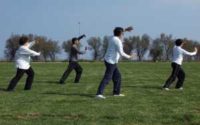Author Interviews, BMJ, Pain Research, Rheumatology / 22.03.2018
Tai Chi At Least As Beneficial As Standard Therapy For Fibromyalgia
MedicalResearch.com Interview with:
 Chenchen Wang MD, MSc
Professor of Medicine
Tufts University School of Medicine
Director, Center For Complementary And Integrative Medicine
Division of Rheumatology
Tufts Medical Center Boston, MA 02111
MedicalResearch.com: What is the background for this study?
Response: Patients with chronic widespread pain often try many different types of pain medications, anti-depressants, physical therapy, and other approaches, and commonly find that none of these therapies work for them. Finding safe, effective approaches for pain management is an urgent priority. Previous evidence suggested that Tai Chi, a multi-dimensional mind-body practice that integrates physical, psychosocial, and behavioral elements, may be especially suited to address both chronic pain and associated psychological and somatic symptoms. In our most recent study published in the BMJ, we directly compared the effectiveness of Tai Chi versus aerobic exercise, which is a standard care non-drug treatment for fibromyalgia. (more…)
Chenchen Wang MD, MSc
Professor of Medicine
Tufts University School of Medicine
Director, Center For Complementary And Integrative Medicine
Division of Rheumatology
Tufts Medical Center Boston, MA 02111
MedicalResearch.com: What is the background for this study?
Response: Patients with chronic widespread pain often try many different types of pain medications, anti-depressants, physical therapy, and other approaches, and commonly find that none of these therapies work for them. Finding safe, effective approaches for pain management is an urgent priority. Previous evidence suggested that Tai Chi, a multi-dimensional mind-body practice that integrates physical, psychosocial, and behavioral elements, may be especially suited to address both chronic pain and associated psychological and somatic symptoms. In our most recent study published in the BMJ, we directly compared the effectiveness of Tai Chi versus aerobic exercise, which is a standard care non-drug treatment for fibromyalgia. (more…)
 Chenchen Wang MD, MSc
Professor of Medicine
Tufts University School of Medicine
Director, Center For Complementary And Integrative Medicine
Division of Rheumatology
Tufts Medical Center Boston, MA 02111
MedicalResearch.com: What is the background for this study?
Response: Patients with chronic widespread pain often try many different types of pain medications, anti-depressants, physical therapy, and other approaches, and commonly find that none of these therapies work for them. Finding safe, effective approaches for pain management is an urgent priority. Previous evidence suggested that Tai Chi, a multi-dimensional mind-body practice that integrates physical, psychosocial, and behavioral elements, may be especially suited to address both chronic pain and associated psychological and somatic symptoms. In our most recent study published in the BMJ, we directly compared the effectiveness of Tai Chi versus aerobic exercise, which is a standard care non-drug treatment for fibromyalgia. (more…)
Chenchen Wang MD, MSc
Professor of Medicine
Tufts University School of Medicine
Director, Center For Complementary And Integrative Medicine
Division of Rheumatology
Tufts Medical Center Boston, MA 02111
MedicalResearch.com: What is the background for this study?
Response: Patients with chronic widespread pain often try many different types of pain medications, anti-depressants, physical therapy, and other approaches, and commonly find that none of these therapies work for them. Finding safe, effective approaches for pain management is an urgent priority. Previous evidence suggested that Tai Chi, a multi-dimensional mind-body practice that integrates physical, psychosocial, and behavioral elements, may be especially suited to address both chronic pain and associated psychological and somatic symptoms. In our most recent study published in the BMJ, we directly compared the effectiveness of Tai Chi versus aerobic exercise, which is a standard care non-drug treatment for fibromyalgia. (more…)
